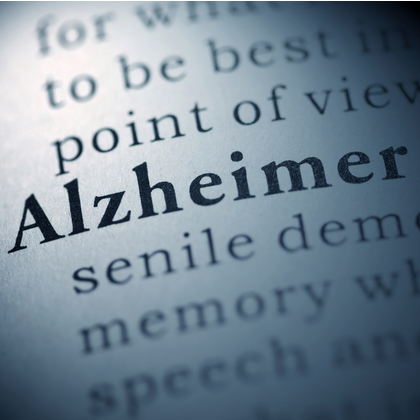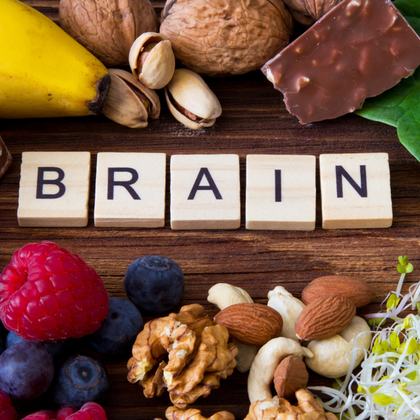
Most of us experience a bit of forgetfulness from time to time. Not being able to remember someone’s name for a moment or two and other similar minor memory lapses affect us all, and are perfectly natural, whatever our age.
But if you’ve noticed that your cognitive abilities – for instance, your memory or your thinking skills – really aren’t as good as they should be, especially as you get older, there’s a chance you could be affected by mild cognitive impairment.
Mild cognitive impairment vs. dementia
Mild cognitive impairment may sound alarming but it’s not the same as dementia. It’s when your cognitive abilities have declined more than average for your age. Indeed most of us find our memory or thinking skills aren’t quite as sharp as they used to be when we get older – this is known as normal cognitive ageing. Mild cognitive impairment, on the other hand, is when these kinds of things are a bit more problematic than they should be at your age – though unlike dementia mild cognitive impairment doesn’t affect your ability to live normally and carry out everyday tasks and activities.
However while it’s not the same as dementia, mild cognitive impairment can lead to dementia – in fact in some cases it could well be a very early sign of dementia. That said, the majority of people with mild cognitive impairment don’t go on to develop dementia.
In fact according to the NHS, only one in 10 people with mild cognitive impairment develops dementia each year, and even after having mild cognitive impairment for 10 years only a third of people progress to dementia (i). The other good news is that 40 per cent of people who are diagnosed with mild cognitive impairment eventually return to a level of cognitive functioning that’s normal for their age.
So how many people are affected? The truth is we don’t really know because it’s thought that not everyone who experiences mild memory or thinking problems mentions it to their doctor. Some experts, however, suggest that between 10 and 20 per cent of people aged 65 or older could be affected by mild cognitive impairment (ii), and that the older you get, the greater your risk. Men are also thought to be more likely to develop mild cognitive impairment than women.
What are the symptoms of mild cognitive impairment?
Mild cognitive impairment is the name for a collection of symptoms rather than one specific disease. These symptoms can be memory related – this is sometimes called amnestic MCI - or they may affect your thinking skills (nonamnestic MCI). So if you have mild cognitive impairment, you may experience problems with one or more of the following:
-
Forgetfulness – for instance you may start having problems remembering important events, appointments or conversations, or you may repeat yourself more often than usual; also you may forget people’s names from time to time (but not the names of people who are closest to you).
-
Problem solving, reasoning, planning and decision making.
-
Language (such as not being able to find the right word).
-
Focus and attention (you may, for instance, find yourself easily distracted).
-
Visual perception – for instance, some people with mild cognitive impairment find it hard to judge distances or cope with walking up or down stairs.
Having the symptoms of mild cognitive impairment may also affect your emotional wellbeing, causing problems such as low mood, depression, irritability, anxiety, anger and frustration.
Because mild cognitive impairment can lead to dementia in some people, it’s important to see a health professional if you’re experiencing any of these symptoms.
The symptoms of mild cognitive impairment are significant enough to be noticeable, not just by the person affected but by their family, friends and others around them too. But they shouldn’t affect your ability to live a normal life. You may need a little more help than usual with some of life’s more demanding tasks, but not with everyday living – if you do need help with normal, daily activities, it could be a sign of dementia rather than mild cognitive impairment.
What causes mild cognitive impairment?
Experts don’t yet understand what causes mild cognitive impairment completely. However it may have a number of possible causes, some of which are treatable – though in many cases there may be no obvious cause at all.
Dementia is thought to be one cause – though not by any means in all cases. According to the Alzheimer’s Society, mild cognitive impairment in some people is classed as a pre-dementia condition (iii). This means their mild cognitive impairment will gradually become worse, and eventually they will be diagnosed with dementia – though this process can take many years.
The US-based Alzheimer’s Association meanwhile says people living with mild cognitive impairment involving memory problems are more likely to develop Alzheimer’s disease or other dementias than those with non-memory problem-related symptoms (iv).
Other possible causes of MCI
According to Patient, some of the many other factors that may have an impact on cognitive impairment include (ii):
-
Stroke
-
Overactive hyperparathyroid glands (hyperparathyroidism)
-
Hypoperfusion (when you have a reduced blood flow, such as with low blood pressure or heart failure)
-
Head injuries
-
Vitamin deficiencies (specifically vitamin B6, B12 and folate)
-
Certain medications (such as sedatives)
-
Menopause (a drop in oestrogen levels may cause forgetfulness in women around the time of the menopause)
Meanwhile, besides dementia, other illnesses can trigger the symptoms of mild cognitive impairment, including Parkinson’s disease (which too can sometimes progress to dementia), multiple sclerosis, syphilis, AIDS and Huntingdon’s chorea.
Living with mild cognitive impairment
Currently there are no medicines or treatments that have been approved for treating mild cognitive impairment, and even drugs used to treat Alzheimer’s haven’t been found to be effective against it.
Since some health conditions – including those listed above – are believed be involved in mild cognitive impairment, treating them wherever possible can often help improve and even reverse the symptoms. Similarly, since mild cognitive impairment is thought to be more likely to progress to dementia in people with a poorly controlled heart conditions or diabetes, or those who have an increased risk of stroke, treating those conditions will be beneficial too.
Other than treating any underlying health problems, people with mild cognitive impairment are typically advised to adopt a healthy lifestyle. This includes eating healthily and maintaining a healthy weight, taking regular physical exercise, staying mentally active and avoiding stress:
Healthy eating
A healthy diet – which can help you keep your weight at a normal level – should ideally include the following:
-
Five portions of fruit and vegetables a day.
-
Plenty of starchy carbohydrates such as pasta, rice, potatoes, bread, porridge and other cereals.
-
Some protein (lean meat, fish, pulses, beans, eggs and other alternative vegetarian or vegan proteins).
-
Some milk and dairy foods (other foods that contain calcium include soya foods, bread, broccoli and cabbage).
-
Occasional small amounts of foods that are high in fat and/or sugar as part of an otherwise healthy balanced diet.
For more details about how diet can affect cognitive health, read our guide
Regular exercise
Staying active is important for good health – both physical and mental. Some studies even suggest exercise is linked with reduced depression symptoms (v) as well as brain and cognitive benefits (vi).
According to the NHS, to stay healthy adults should do 150 minutes of moderate-intensity activity every week (vii). Any type of physical activity is better than none, even doing the housework or gardening. However if you have an existing medical condition or you haven’t been very active lately, always speak to a healthcare professional before taking on any new exercise regime.
Have an active mind
Some experts believe people who keep their minds active throughout their lives may have lower rates of cognitive problems (viii). Some of the things you could try to keep your brain active include reading, learning new languages, playing musical instruments and having new activities or hobbies, plus you could also try playing games such as board games or even online games like chess or play Scrabble on your phone .
Staying socially active is thought to be important for a healthy brain, so it’s a good idea to have an active social life too. This doesn’t just mean meeting up with friends and family but could also include things like taking part in group sports, taking a class at your local education centre or volunteering in your local community.
There are more tips on staying connected in our article How to deal with loneliness and feeling isolated.
Learn to destress
Being stressed out in the long term – rather than merely having a stressful day now and then – is thought to cause changes in your brain (ix). So try to limit stress whenever you can – read our guide to stress symptoms and signs for tips to help you stay calm.
On the other hand if you’re currently experiencing low mood or depression, try not to put off taking steps to manage it and keep it under control. Some experts believe depression and the risk of dementia are linked (x), with some thinking depression may in fact be an early symptom of dementia and others suggesting depression could play a part in the development of dementia (xi). Find out more about ways to manage depression naturally in our guide to depression signs and symptoms.
Meanwhile a healthy lifestyle also includes not smoking and limiting your drinking to the government’s recommended levels (this is no more than 14 units each week on a regular basis). Getting plenty of sleep is also advisable – see our guide to sleep and insomnia for advice if you’re not sleeping as well as you should.
Self help tips for mild cognitive impairment
As well as having as healthy a lifestyle as possible, there are other things you can do to make everyday life with mild cognitive impairment easier:
-
Make lots of to-do lists to keep yourself on track. If it helps, keep a diary to write anything down that you need to remember, or stick messages written on Post-It notes in places that will remind you to do certain things.
-
Only tackle one thing on your list at a time, as trying to multitask can be difficult even for people with normal cognitive functioning.
-
If you’re struggling with a complicated task, break it up into lots of smaller steps – like following a recipe, for instance, one step at a time.
-
Stick to a regular routine – it helps to give your day structure, and that can help you remember what you should be doing.
-
If you often forget what day it is, consider putting up a calendar or order a daily newspaper to remind you.
-
Set up direct debits or standing orders to pay any regular bills you don’t want to miss.
-
Always keep important things such as keys in the same place so you’ll know where to find them. Keep phone numbers you use regularly on a list by your phone too.
What supplements are good for brain function?
Besides the lifestyle and other measures outlined above, you could also consider taking natural supplements to give your brain some nutritional support, such as:
High-strength fish oils: Supplements made from oily fish that contain the omega-3 fatty acids EPA and DHA are thought to be good for your brain, so they may be particularly beneficial if you don’t like eating fish. If you’re a vegetarian or vegan you can now get these important omega-3s in a veggie/vegan-friendly formulation – look for omega-3 supplements that contain algae, which supply fish with omega-3s in the first place.
Turmeric (curcumin): Curcumin is one of the many active ingredients found in the curry spice turmeric, and may be helpful for cognitive decline. You can add turmeric to your food, or take a turmeric supplement if that’s more convenient. Consider trying a good-quality supplement that provides a high percentage of curcuminoids (curcumin is a type of curcuminoid).
Ginkgo biloba: Nutritional therapists often use the herb ginkgo biloba to treat memory problems and cognitive function in older people.
B complex: It’s thought that some of the B vitamins – including vitamin B6, B12 and folate (or folic acid) – may help slow down cognitive decline. B vitamins are widely available in our diet, but many people may not get enough of them. You can take individual B vitamin supplements, but it’s often considered more convenient to take a B complex supplement or a multivitamin formula with good levels of the Bs.
Astaxanthin: Antioxidants may be helpful in supporting cognitive health, especially if your levels are already less than decent. A particularly potent antioxidant found in a type of freshwater algae, astaxanthin can be found in supplement form as well as in foods such as salmon, lobster, crawfish, rainbow trout and crab. As a supplement it is usually suitable for vegetarians and vegans (check the label – some capsules can contain non-vegetarian and non-vegan ingredients).
Iodine: If you’re deficient in this essential mineral it can lead to an underactive thyroid, which can affect your cognition. You can get iodine in fish, eggs and other dairy products, as well as in nutritional supplements such as multivitamins.
Rosemary: Both the scent and compounds found in rosemary may be beneficial for memory problems. Add some of this fragrant herb to your food, or look for a nutritional supplement that contains it. You can also release the smell of rosemary essential oil in a heat-based diffuser.
Iron: This essential nutrient helps with blood flow, including blood flow to the brain, and is thought to help with cognitive health especially in those who are deficient in it. If you don’t eat a lot of iron-rich foods – such as red meat, liver, beans and nuts – you can get it in a single supplement or as part of a multivitamin formulation.
Phosphatidyl serine: Found in foods such as egg yolks, soya beans, fish and meat, phosphatidyl serine is often sold as a brain health supplement, as some experts think it may help boost memory and cognition.
Vitamin C: Like the B vitamins, vitamin C is widely found in foods – yet some people may not be getting enough of it in their diets. Some scientists even believe it may help with cognitive functioning. You can get vitamin C supplements in many forms, including tablets, capsules and powder.
Magnesium: Found in foods such as dark chocolate, nuts, seeds, legumes, milk, oily fish, red meat and leafy green vegetables, magnesium may be beneficial if you want to give your brain a boost. However, despite the fact that it’s in many different foods, some people may have low levels of magnesium. If you want to try a supplement, look for magnesium in a more absorbable form, such as magnesium citrate.
Green tea: If you like drinking green tea, your brain may already be getting a supply of certain helpful compounds. If you’re not a fan of the taste, however, you can try a green tea supplement – choose a product with a good level of active antioxidant ingredients called polyphenols.
If you want to read more about these and other supplements, including a breakdown of the scientific evidence that supports their use for cognition support, read our guide to Diet and cognitive health.
For information about a wide range of physical, mental and cognitive health and wellbeing issues, take a tour around our health library.
References:
-
Available online: https://www.nhft.nhs.uk/download.cfm?doc=docm93jijm4n9628
-
Available online: https://patient.info/doctor/mild-cognitive-impairment
-
Available online: https://www.alzheimers.org.uk/sites/default/files/pdf/factsheet_what_is_mild_cognitive_impairment_mci.pdf
-
Available online: https://www.alz.org/alzheimers-dementia/what-is-dementia/related_conditions/mild-cognitive-impairment
-
Available online: https://www.nia.nih.gov/news/moderate-physical-activity-linked-increases-metabolism-across-brain-regions
-
Available online: https://www.nia.nih.gov/news/moderate-physical-activity-linked-increases-metabolism-across-brain-regions
Available online: https://www.nia.nih.gov/news/physical-activity-and-motor-ability-associated-better-cognition-older-adults-even-dementia -
Available online: https://www.nhs.uk/live-well/exercise/
-
Available online: https://www.nhs.uk/conditions/alzheimers-disease/prevention/
-
McEwen BS. et al., Neurobiological and Systemic Effects of Chronic Stress. Chronic Stress (Thousand Oaks). Jan-Dec 2017;1:2470547017692328. Available online: https://www.ncbi.nlm.nih.gov/pmc/articles/PMC5573220/
-
Prince M et al. World Alzheimer Report 2014 Dementia and Risk Reduction: an analysis of protective and modifiable factors, Alzheimer’s Disease International, London. Available online: https://www.alzint.org/u/WorldAlzheimerReport2014.pdf
-
Ray S, Davidson S. Dementia and Cognitive Decline. Age UK Research 2014. Available online: https://www.ageuk.org.uk/globalassets/age-uk/documents/reports-and-publications/reports-and-briefings/health--wellbeing/rb_oct14_cognitive_decline_and_dementia_evidence_review_age_uk.pdf
Related Posts
Disclaimer: The information presented by Nature's Best is for informational purposes only. It is based on scientific studies (human, animal, or in vitro), clinical experience, or traditional usage as cited in each article. The results reported may not necessarily occur in all individuals. Self-treatment is not recommended for life-threatening conditions that require medical treatment under a doctor's care. For many of the conditions discussed, treatment with prescription or over the counter medication is also available. Consult your doctor, practitioner, and/or pharmacist for any health problem and before using any supplements or before making any changes in prescribed medications.

Christine
Christine Morgan has been a freelance health and wellbeing journalist for almost 20 years, having written for numerous publications including the Daily Mirror, S Magazine, Top Sante, Healthy, Woman & Home, Zest, Allergy, Healthy Times and Pregnancy & Birth; she has also edited several titles such as Women’ Health, Shine’s Real Health & Beauty and All About Health.
View More



